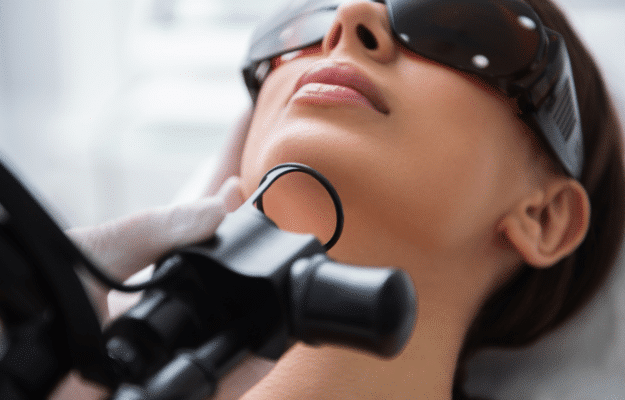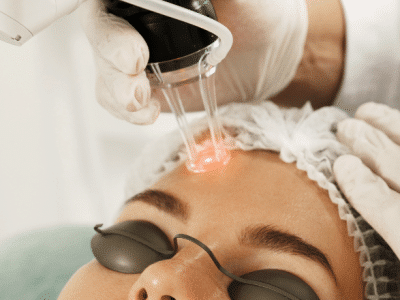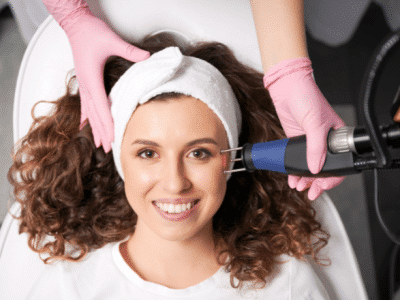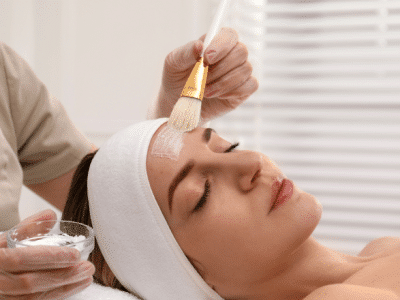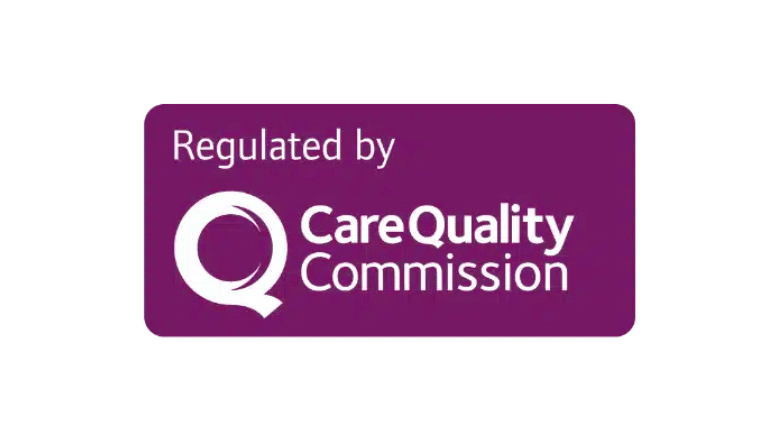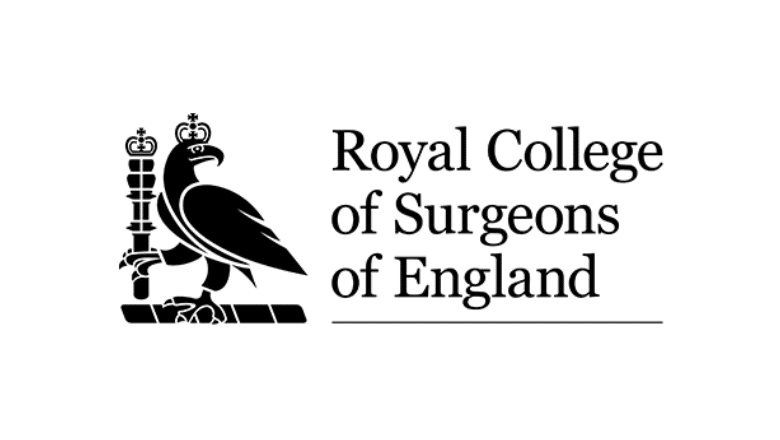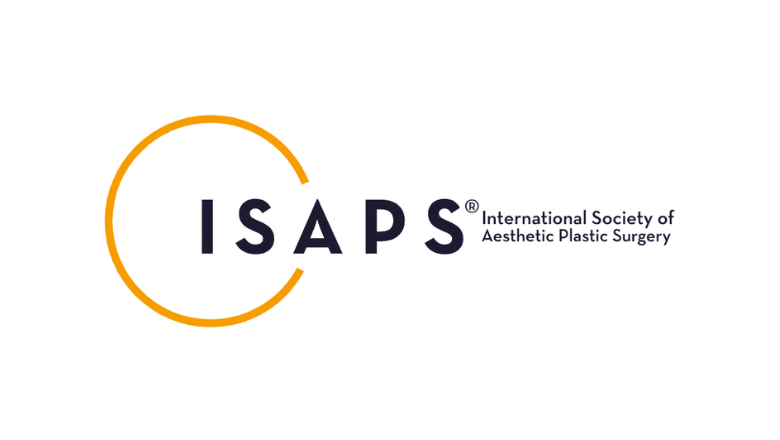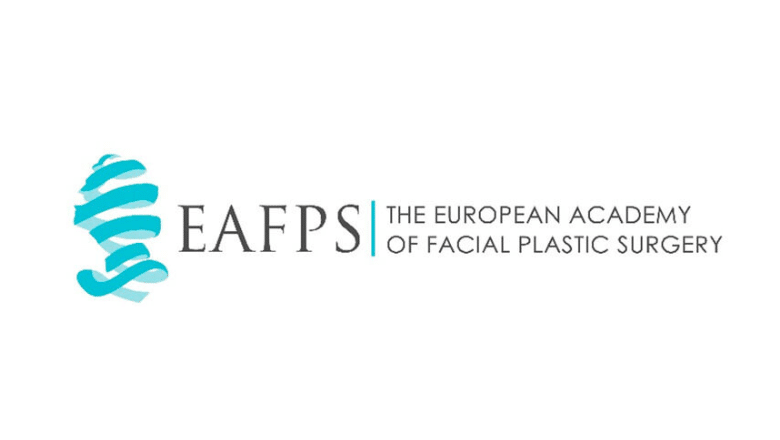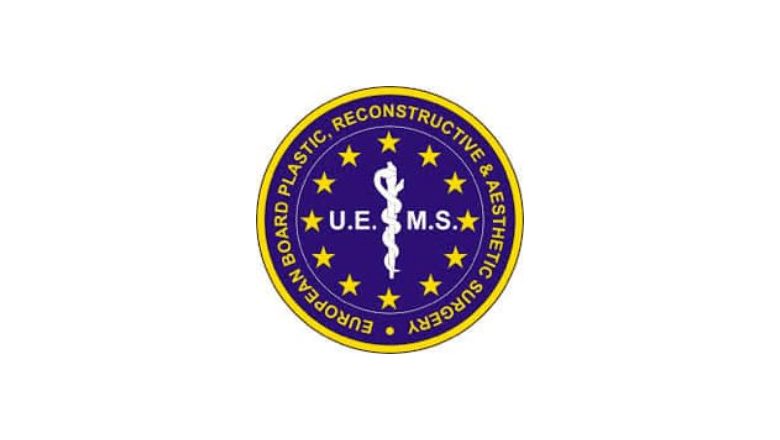Laser Acne Treatment in London
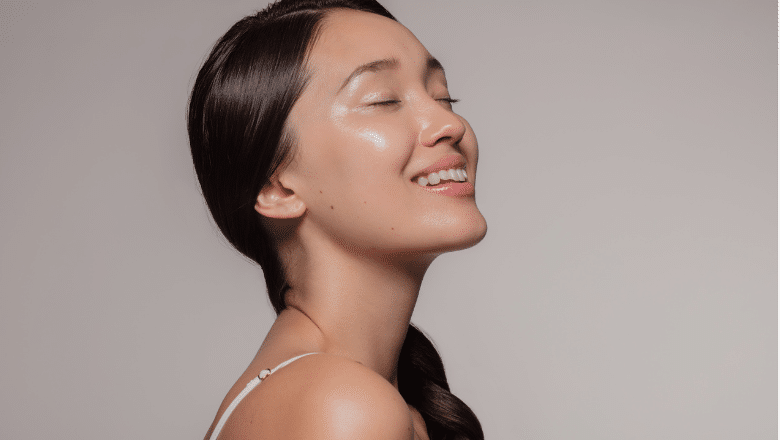
Discover clearer, revitalised skin with our advanced laser acne treatment, offering a swift, effective solution to both active acne and scarring with minimal downtime
Acne is a widespread skin issue that arises when hair follicles are clogged with oil and dead skin cells. This blockage leads to the formation of breakouts or pimples. Contrary to the common belief that acne is only a teenage problem, it can affect individuals at any age. The presence of acne can be more than just a physical concern; it often leads to emotional distress and a lack of confidence, driving many to seek effective treatments.
One of the advanced solutions in the realm of acne treatment is the use of laser technology, specifically the Fotona laser. This method utilises laser energy to not only diminish the visibility of acne but also to address the underlying issues, such as the overactive sebaceous glands responsible for excess oil production. The versatility of acne laser treatment lies in its dual capability. It offers a remedy for ongoing, active acne and simultaneously works to reduce the visibility of acne scars. This dual-action approach provides a comprehensive treatment, tackling both the current state and the residual effects of acne.
The Fotona laser treatment stands out due to its precision and effectiveness. Targeting the problem areas with laser energy helps clear the skin while ensuring minimal discomfort and downtime. This makes it a highly sought-after option for those looking for a reliable solution to their acne problems.
Discover Advanced Acne Treatment with TwinLight Laser
At Centre for Surgery, we are dedicated to offering the finest treatment options for individuals experiencing acne breakouts. Our commitment to utilising cutting-edge technology is reflected in our choice of the Fotona TwinLight laser system. This state-of-the-art laser employs two synergistic wavelengths, Er:YAG and Nd:YAG, which are specifically designed to target acne-prone skin with precision and care.
The TwinLight laser treatment stands out for its ability to provide safe and effective acne management. The unique combination of these two wavelengths allows for a comprehensive approach to treating acne. The Er:YAG wavelength is adept at gently exfoliating the skin, removing dead skin cells and unclogging pores, which are key contributors to acne formation. Meanwhile, the Nd:YAG wavelength delves deeper, targeting the sebaceous glands to reduce oil production, a fundamental cause of acne. This dual-wavelength strategy not only treats existing acne but also works to prevent future breakouts, ensuring long-lasting results.
Our specialists at Centre for Surgery are experts in laser treatments and are committed to delivering personalised care. We understand that each individual’s skin is unique, and our specialists tailor the treatment to meet your specific needs, ensuring optimal outcomes.
We invite you to contact Centre for Surgery to schedule a consultation with our laser specialists. Discover how the TwinLight laser treatment can transform your complexion, refine your skin, and effectively address your acne concerns. Experience the difference with our advanced, patient-focused care, and take the first step towards achieving clearer, healthier skin.
Why choose Centre for Surgery for acne treatment?
Acne specialists at the Centre for Surgery are renowned for treating all types of acne using state-of-the-art treatments.
- We have some of the most experienced specialists in laser acne treatment in the UK.
- Our acne laser specialists treat over 150 acne patients each year
- Our specialist acne clinic is located on Baker Street in Marylebone
Laser Acne treatment Before & After Photos
Case 1:
Complete clearance with only one treatment of Nd:YAG laser.
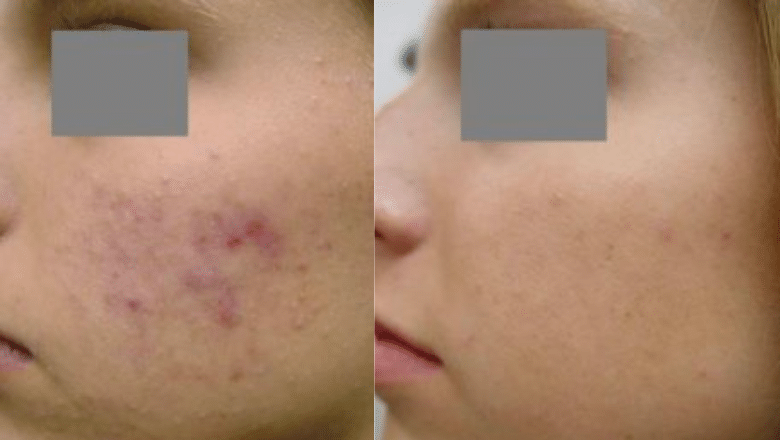
Case 2:
This patient had a 3-year history of acne on the face. The patient had tried multiple oral and topical treatments, retinoids and benzoyl peroxide with minimal improvement. The patient had four sessions of Nd:YAG laser every two weeks. The after photo was taken after the final treatment and there was no recurrence at the 1-year follow-up appointment.
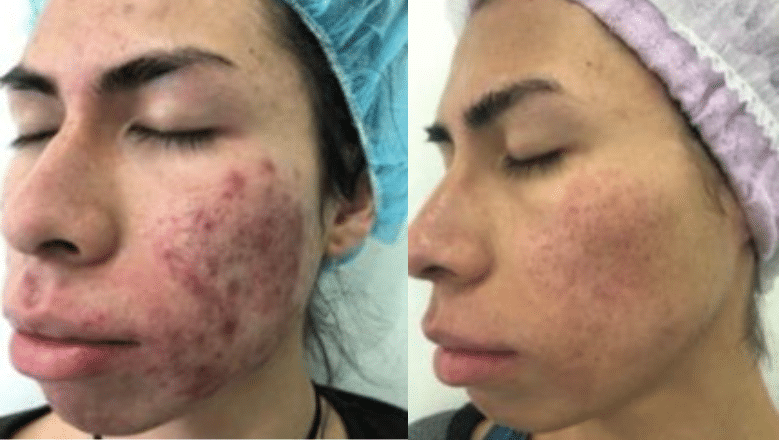
Case 3:
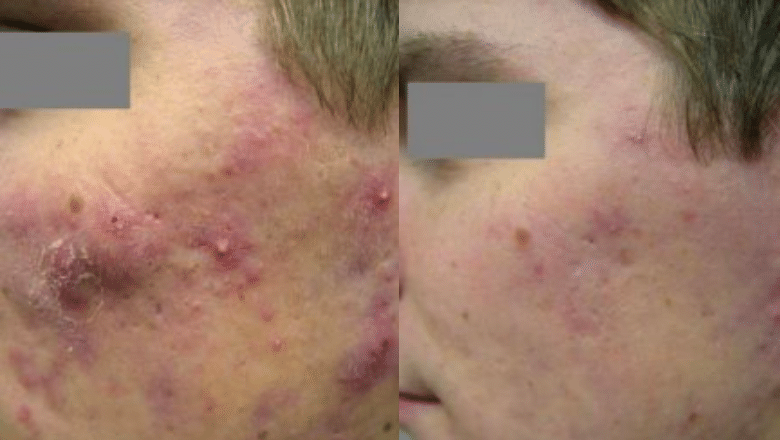
Case 4:
This was a 22-year-old Chinese male who had active acne for over six months. He had tried many different treatments, including topical acne treatments. He was not keen on taking acne drugs and wanted a faster solution. Three sessions of Nd:YAG laser were performed. Each treatment was spaced 28 days apart.
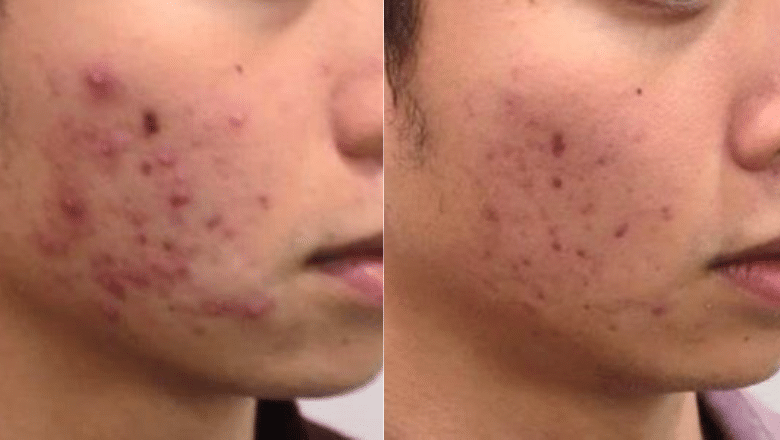
Case 5:
Cystic acne is very unpleasant and presents as inflamed pustules filled with pus. Before and after the treatment of acutely painful cystic acne lesion of the nose with combined Nd:YAG and Erbium laser
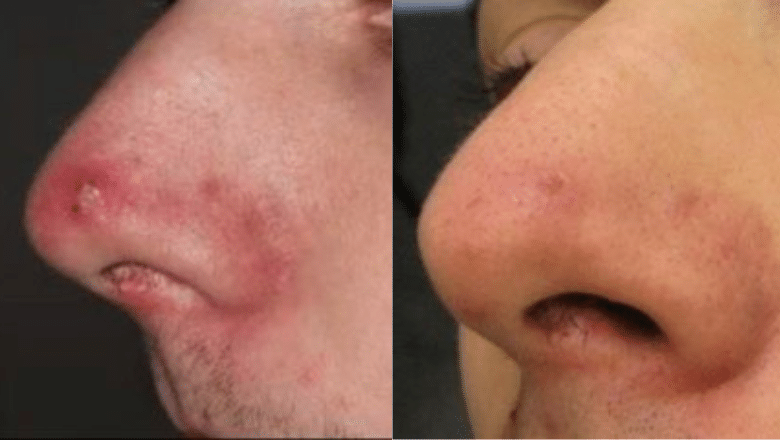
Case 6:
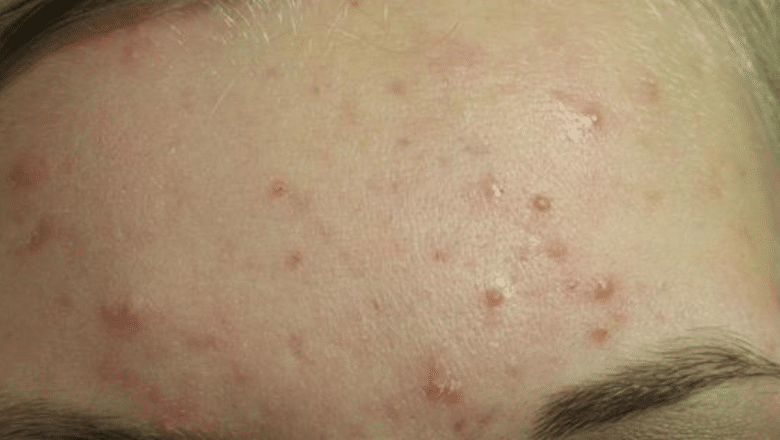
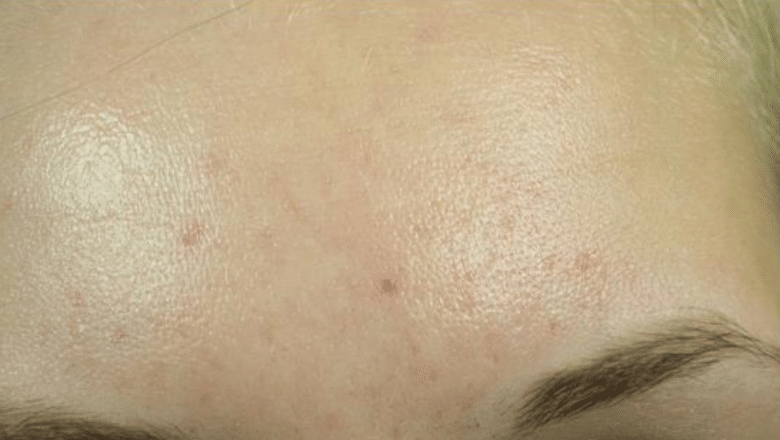
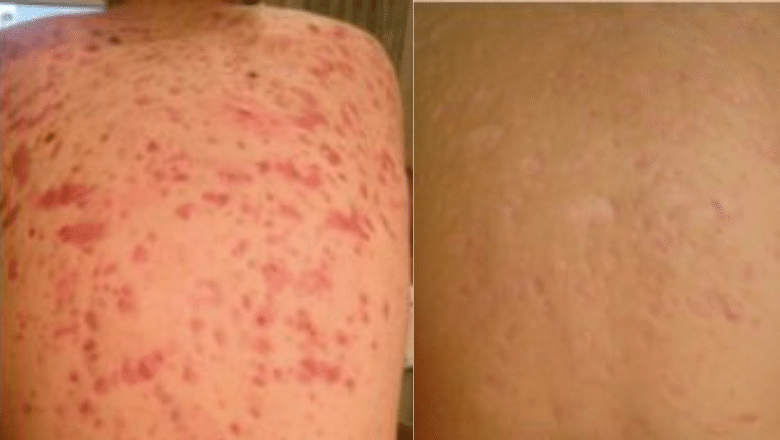
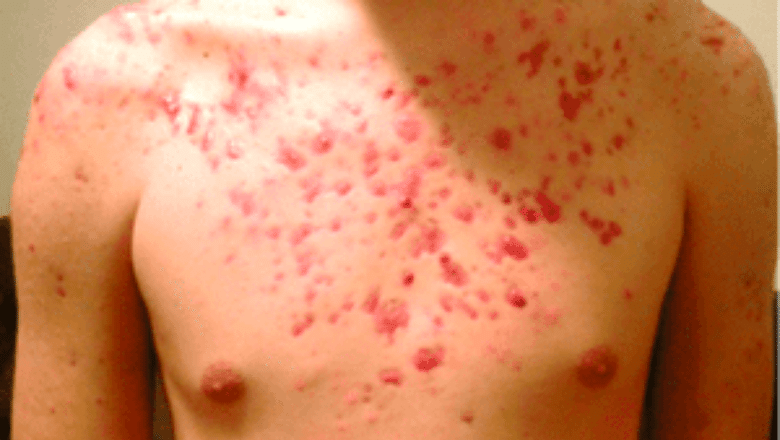
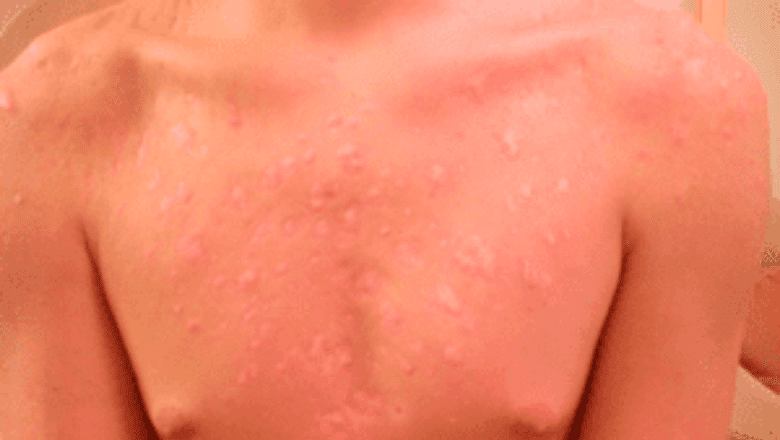
Benefits of Laser Acne Treatment
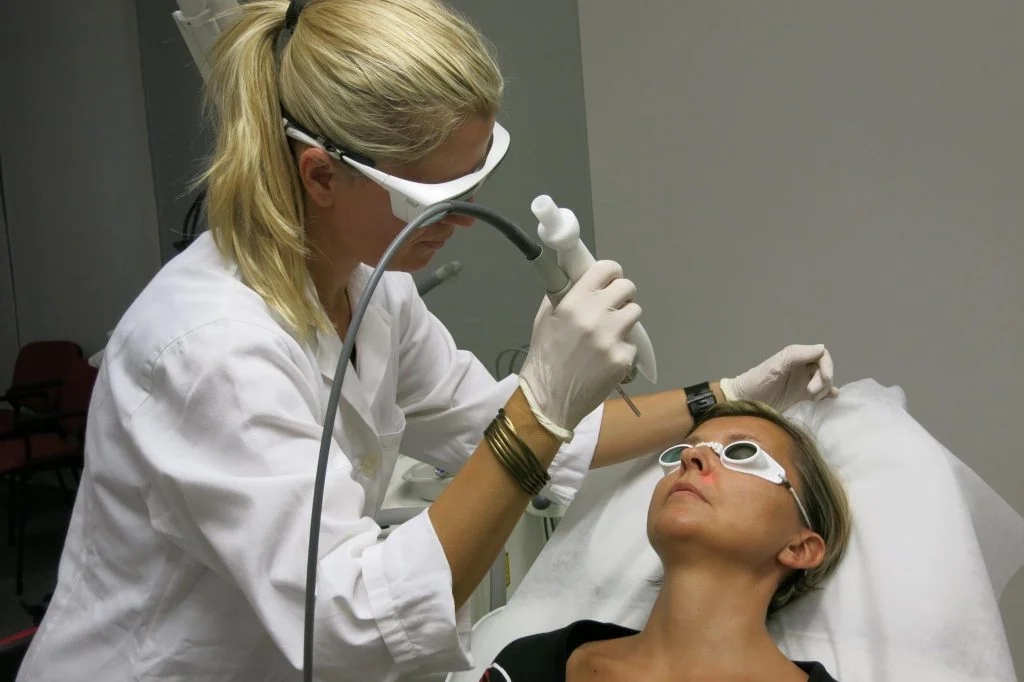
The Fotona TwinLight laser treatment, a prominent service offered at Centre for Surgery, is renowned for its multitude of benefits in treating acne and its related concerns. This advanced treatment stands out for its effectiveness and safety, providing a holistic solution for those battling with acne and its after-effects. Here’s an in-depth look at the various advantages of this innovative treatment:
- Dual Treatment for Active Acne and Scarring: One of the most significant benefits of the TwinLight treatment is its ability to address both active acne and acne scarring simultaneously. This dual approach ensures comprehensive care, tackling the immediate breakouts and the longer-term skin texture issues caused by acne scarring.
- Non-reliance on Medication: A major advantage of the TwinLight laser treatment is that it eliminates the need for acne medications, which often come with a range of potential side effects. This is particularly beneficial for those who are sensitive to medications or prefer a drug-free approach to acne treatment.
- Precision and Safety: The Fotona technology’s hallmark is its precision. It allows for controlled, accurate delivery of laser energy, ensuring that the treatment is effective without causing damage to the surrounding tissues. This precision ensures both the safety and effectiveness of the treatment.
- Minimal Downtime: Unlike some other acne treatments that require a significant recovery period, the TwinLight treatment is fast and gentle, with minimal downtime. This means patients can return to their daily activities soon after treatment, making it a convenient option for those with busy lifestyles.
- Skin Resurfacing and Collagen Stimulation: The treatment goes beyond just treating acne and scars; it also resurfaces the skin. By stimulating the body’s natural collagen production, it promotes the development of healthier, rejuvenated skin. The result is a smoother, more youthful appearance, with improved skin texture and tone.
Am I A Suitable Candidate for Acne Laser Treatment?
If you’re considering laser acne or acne scarring treatment, it’s crucial to understand the criteria that make someone an ideal candidate for this procedure. Meeting these criteria not only ensures the effectiveness of the treatment but also contributes to your overall safety and satisfaction. Here’s what you need to consider to determine if you’re a suitable candidate:
- Age Requirement: Candidates should be over the age of 18. This age criterion is important because it ensures that the patient’s skin has matured enough for the treatment to be safe and effective.
- General Health Status: Being in good health is a fundamental requirement. Good health implies that your body can heal effectively post-treatment and that you have a lower risk of complications during and after the procedure.
- Severity of Acne: The treatment is most effective for individuals with mild to moderate acne. If you have this level of acne severity, you’re likely to see more significant improvements from the laser treatment.
- Realistic Expectations: It’s essential to have realistic expectations about the results that Fotona laser acne treatment can achieve. Understanding what the treatment can and cannot do will help align your expectations with the likely outcomes, leading to greater satisfaction with the results.
If you find that you meet these criteria, you may be a suitable candidate for laser acne treatment. However, it’s important to have a detailed consultation with a laser specialist at Centre for Surgery who can assess your specific condition and confirm your suitability. This consultation is also a great opportunity to ask any questions you might have about the treatment process, expected results, and any other concerns.
How Much Does Laser Acne Treatment Cost?
The cost of Acne Laser Treatment in London is influenced by the size of the area being treated and the total number of sessions booked. Here’s a detailed pricing table for better clarity:
| Treatment Area | Price for 1 Session | Price for 3 Sessions |
|---|---|---|
| Half Face | £300 | £800 |
| Full Face | £400 | £1050 |
| Small Area | £120 | Not Specified |
Please note that for the ‘Small Area’ option, the price for three sessions is not provided in the initial information. For precise details, especially for multiple sessions involving small areas, it would be advisable to consult directly with our clinic.
Acne Laser Treatment in London: Why Centre for Surgery is Your Premier Choice
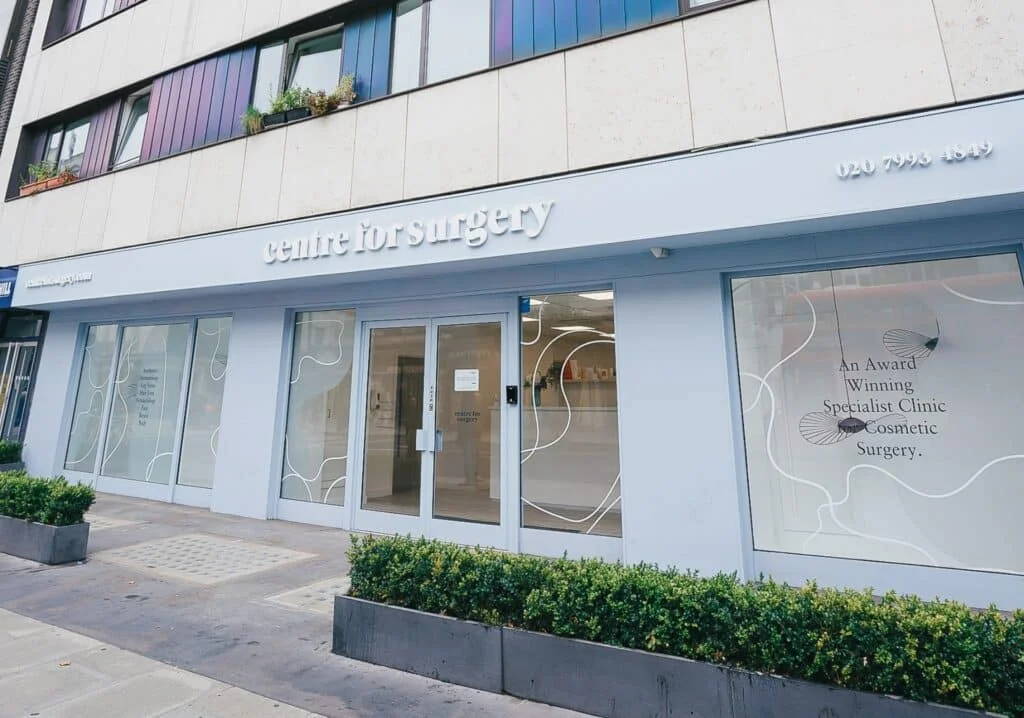
FAQs
-
What Exactly Causes Acne?The development of acne is primarily linked to the overactivity of the sebaceous glands in the skin. These glands are responsible for producing sebum, an oily substance meant to keep our skin hydrated and protected. However, when these glands produce too much sebum, it leads to a build-up. This excess oil, along with dead skin cells, accumulates within the hair follicles. This blockage is a perfect breeding ground for bacteria, leading to inflammation and resulting in various forms of acne, such as whiteheads, blackheads, and pimples. Factors like hormonal imbalances, diet, stress, and genetics also play a significant role in exacerbating this condition.
-
What is the Mechanism Behind Laser Acne Treatments?Laser acne treatments operate on a principle of targeted light therapy. Specifically, the laser emits concentrated light beams, which are absorbed by the skin. These beams target overactive sebaceous glands, reducing their ability to produce excessive oil. Additionally, the heat from the laser opens up clogged pores and kills bacteria that contribute to acne. The laser's heat also promotes the natural healing processes of the skin, encouraging new, healthy skin cell growth and reducing the likelihood of new acne flare-ups. This process not only treats existing acne but also aids in preventing future breakouts by normalising skin functioning.
-
Can Laser Treatment Address All Types of Acne?Laser treatments are versatile and can be effective for a wide range of acne types, from mild to severe, including cystic acne. The ability to combine different laser wavelengths allows for a customised approach that can be tailored to treat the specific type and severity of acne presented by each patient, offering a personalised treatment plan for optimal results.
-
Are Laser Acne Treatments Suitable for All Skin Types?Laser acne treatments are generally safe for all skin types. However, individuals with particularly photosensitive skin or certain skin conditions should consult with a doctor before pursuing treatment. A professional assessment can determine if laser treatment is appropriate and ensure that it is conducted safely and effectively for each individual's skin type and condition.
-
Is Undergoing Laser Acne Treatment Safe?Laser treatments for acne are widely regarded as safe and effective. Using advanced technologies like the TwinLight protocol, which combines Nd:YAG and Er:YAG lasers, the treatment achieves a balance of efficacy and safety. The Nd:YAG laser complements the ablative action of the Er:YAG laser by penetrating deeply without harming the skin's surface. Furthermore, innovations in laser handpiece technology allow for precise and controlled delivery of laser energy to the treatment area, minimising the risk of side effects and ensuring patient comfort and safety.
-
Do Laser Treatments for Acne Cause Pain?Patients typically do not experience pain during laser acne treatments. However, some may feel a mild warming or pinching sensation as the laser heats the skin and the tissues underneath. To ensure patient comfort, cooling systems like the icool system are used during the procedure. This system keeps the skin at a comfortable temperature throughout the treatment, making the experience as pleasant as possible for the patient.
-
What is the Duration of a Laser Treatment Session?A typical session of Fotona TwinLight laser treatment lasts about an hour. This duration allows for thorough coverage of the affected areas and ensures that the laser can effectively target and treat the acne and any associated scarring.
-
When Can Results from Laser Treatment Be Expected?The timeframe for seeing results from laser acne treatments can vary from patient to patient. Many individuals notice immediate improvements in their skin's texture and general appearance shortly after treatment. However
-
How Are Acne Scars Formed?When acne penetrates the skin deeply, it damages the skin and the tissue beneath it. As the acne clears, the body tries to repair this damage. During the healing process, the body produces collagen, a substance that gives the skin support. If the body produces too little or too much collagen, scars can form. Insufficient collagen production leads to depressions or pits on the skin (atrophic scars), whereas an excess of collagen leads to raised scars (hypertrophic scars or keloids). The appearance of these scars can vary widely, depending on the severity of the acne and the individual's skin type and healing response.
-
Are Laser Treatments Effective in Removing Acne Scars?Laser treatments are highly effective in addressing acne scars through a process known as laser skin resurfacing. This treatment targets the outer layers of the skin, vaporising scarred areas and promoting the regeneration of healthier skin. The laser stimulates the dermis, the deeper layer of skin, to produce more collagen, which is crucial for healthy skin structure. By doing so, the skin's texture becomes smoother, and the appearance of scars is significantly diminished. The use of complementary wavelengths, such as Er:YAG and Nd:YAG lasers, ensures a thorough treatment that addresses both the superficial and deeper layers of the skin for optimal results.
What To Expect
Consultation
At Centre for Surgery, when you come in for your first appointment, our experts will conduct a thorough examination of your skin. This is an essential step to understand the specific issues you're facing with acne. Alongside this, they'll engage in a detailed discussion about your primary concerns related to your acne. This step is crucial in tailoring the treatment to your unique needs.
Moreover, an integral part of this initial meeting involves a conversation about your overall health and medical history. This is not just a routine procedure, but a necessary step to confirm whether laser treatment is a safe and suitable option for you. Our specialists place a high emphasis on patient safety and suitability for any procedure.
One of the key aspects of the consultation is the detailed explanation provided by the specialist about the laser technology used for treating acne. They will take you through how the laser treatment works, what it involves, and most importantly, what outcomes you can realistically expect from this treatment. This is vital to ensure that your expectations align with what can be achieved through the treatment.
If, after careful evaluation, you are considered a good candidate for laser acne treatment, our specialists will conduct a small patch test. This test is essential to ensure that your skin can safely tolerate the laser treatment. This step reflects our commitment to personalised care and patient safety.
Following the successful patch test, our experts will create a tailor-made treatment plan that's specifically designed to address your unique skin needs. This bespoke plan is not a one-size-fits-all solution; rather, it is thoughtfully crafted to maximise the effectiveness of your treatment while focusing on your individual requirements and goals.
The Procedure
Fotona's Laser Acne Treatment represents a cutting-edge approach in addressing acne and its related skin concerns. This treatment stands out due to its use of two distinct laser wavelengths, namely Er:YAG and Nd:YAG. These wavelengths work in tandem to deliver optimal results, each targeting different aspects of acne and skin rejuvenation.
The process is designed to be comfortable for patients, typically not causing pain. During the treatment, patients might experience a mild warming or a sensation akin to a light pinch. This sensation is a normal part of the procedure as the laser works on the skin and the tissues underneath.
The treatment protocol, known as TwinLight, is customised based on the individual needs of each patient. It utilises both the Nd:YAG and Er:YAG wavelengths in a complementary manner:
Nd:YAG Laser: This part of the treatment focuses on managing active acne. The high-power Nd:YAG laser penetrates the skin deeply, heating and meticulously destroying the larger sebaceous glands. These glands are often at the root of acne breakouts, and their targeted treatment can significantly reduce the incidence and severity of acne.
Er:YAG Laser: Following the Nd:YAG treatment, the Er:YAG laser, which is ablative in nature, is employed. This stage is crucial for addressing surface-level skin imperfections and treating acne scars. The laser gently vaporises the outermost layer of the skin, revealing the undamaged, healthier skin beneath. This step is instrumental in smoothing out the skin's texture and appearance.
Additionally, the combined action of the Er:YAG and Nd:YAG lasers not only addresses the immediate acne and scar issues but also promotes the natural production and remodelling of collagen within the dermis. This aspect of the treatment contributes to the long-term health and clarity of the skin, with results becoming increasingly apparent in the months following the treatment.
Aftercare & Results
Post-treatment care is a critical aspect of the acne laser treatment process at Centre for Surgery. Our specialists provide detailed aftercare instructions to ensure optimal healing and results. While many patients find they can return to their daily routines immediately after treatment, it's important to remember that individual experiences may vary. In some cases, particularly after more intensive sessions, a period of downtime may be necessary.
As part of the recovery process, you might encounter some common side effects, including swelling, redness, scabbing, and peeling of the treated area. These are normal reactions and are part of the healing process. However, it's crucial to avoid picking at the skin during this period. Interfering with the healing skin can adversely affect your results and may potentially harm the tissue.
Sun protection plays a vital role in post-treatment care. Avoiding sun exposure and diligently applying a high-SPF sunscreen (SPF 50+) is strongly advised, especially during the first two weeks after treatment. This practice is not just about sunburn prevention; it's about ensuring proper and safe healing of the treated skin.
Patients often notice an immediate improvement in the texture and appearance of their skin following treatment. However, it's important to understand that the full benefits of the TwinLight treatment will become more apparent over time. This is because the treatment stimulates new collagen production, a process that can take up to 2-3 months to fully manifest.
The number of sessions required to achieve your desired outcomes will be determined during your consultation with our laser specialist. Generally, most patients achieve the best results after 2-3 sessions, spaced 4-6 weeks apart. Additionally, some patients opt for annual 'top-up' sessions to maintain their results.
